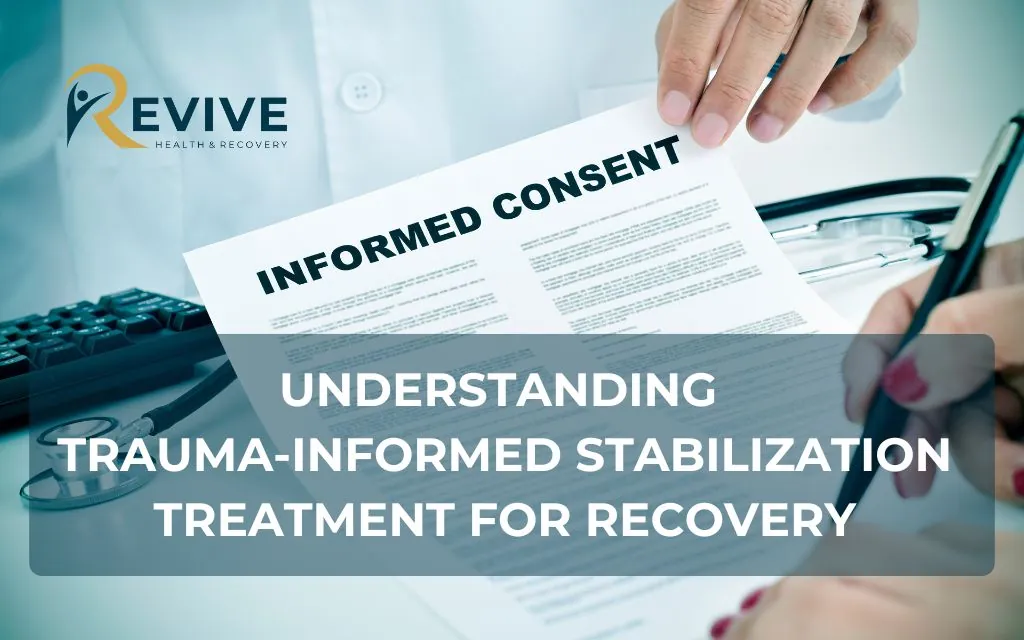For Emotional Wound Care, Trauma affects countless individuals in our community, disrupting lives and creating barriers to wellness. At Revive Health Recovery, we recognize the profound impact trauma has on mental health and recovery. Trauma Informed Stabilization Treatment (TIST) offers a powerful approach for Denver residents seeking liberation from trauma’s grip. This specialized therapy addresses the complex needs of trauma survivors through evidence-based methods that promote safety, stability, and gradual healing.
What is Trauma Informed Stabilization Treatment (TIST)?
The Basics of TIST
Trauma Informed Stabilization Treatment represents a specialized therapeutic framework designed for individuals experiencing severe trauma symptoms including self-harm behaviors, dissociation, emotional dysregulation, and post-traumatic stress disorder (PTSD). Developed by renowned trauma expert Dr. Janina Fisher, TIST builds upon decades of clinical research in trauma recovery, complementing other approaches like intensive trauma therapy offered at Revive Health Recovery.
The treatment acknowledges the neurobiological impact of trauma and employs a trauma-informed approach that recognizes how traumatic experiences reshape the brain and body’s response systems, as explained by the American Psychological Association. TIST prioritizes stabilization as the essential foundation for trauma recovery, establishing safety before processing traumatic memories.
How TIST Works
TIST – trauma informed stabilization treatment – operates through a “parts” approach based on Structural Dissociation theory, which recognizes that trauma can fragment a person’s internal experience. The therapy helps clients identify and work with these different parts of themselves—those carrying traumatic memories and those managing daily functioning.
Core components include:
- Grounding techniques that anchor clients in the present moment
- Body-based interventions that address somatic trauma responses
- Mindfulness practices that cultivate awareness without judgment
- Skills for emotional regulation and distress tolerance
- Resources for developing internal safety
Through these methods, clients gradually develop the capacity to regulate overwhelming emotions and physical sensations associated with trauma, creating a sense of control and stability.

What Sets TIST Apart
Trauma Informed Stabilization Treatment TIST distinguishes itself through its integration of multiple therapeutic frameworks, particularly Internal Family Systems (IFS) and sensorimotor psychotherapy. This integration allows for a comprehensive approach addressing cognitive, emotional, and physical dimensions of trauma.
Unlike some trauma therapies that focus primarily on processing traumatic memories, TIST emphasizes stabilization as an essential goal in itself. For many survivors, especially those with complex PTSD, establishing safety and regulation skills must precede trauma processing work.
For those ready to process traumatic memories after stabilization, complementary approaches like EMDR therapy for complex trauma can be highly effective.
The therapeutic relationship in TIST serves as a crucial vehicle for healing. Therapists trained in trauma-informed care for healthcare settings and PTSD in Denver create environments of consistent safety, attunement, and compassion—often providing corrective relational experiences for clients whose trauma occurred within relationships.
Who Can Benefit from TIST in Denver?
Target Audience
Trauma Informed Stabilization Treatment TIST supports diverse individuals affected by trauma in the Denver community:
- Adults with histories of childhood abuse or neglect
- Survivors of domestic violence, sexual assault, or other interpersonal trauma
- Individuals with complex PTSD from prolonged, repeated trauma
- People experiencing dissociative symptoms or struggling with self-harm
- Those who found traditional talk therapy insufficient for trauma healing
- Family members supporting loved ones through trauma recovery
Finding a qualified trauma informed stabilization therapist in Denver represents a crucial step toward healing from these experiences.
Common Symptoms Addressed
TIST specifically targets symptoms that often prove challenging to address through conventional therapies:
- Self-destructive behaviors and self-harm
- Overwhelming emotional reactions and emotional numbing
- Intrusive memories and flashbacks
- Dissociative episodes
- Difficulty maintaining relationships
- Persistent negative beliefs about self and others
- Hypervigilance and heightened startle responses
- Sleep disturbances
The stabilization focus helps clients develop comprehensive safety planning strategies and build tolerance for distressing emotions without resorting to harmful coping mechanisms.
For Denver residents struggling with these symptoms, PTSD treatment in Denver through TIST can provide targeted relief and long-term recovery.
Finding Trauma Informed Stabilization Treatment Therapy in Denver

How to Locate a TIST Therapist
Finding specialized trauma treatment requires deliberate searching. Consider these steps to locate a Trauma Informed Stabilization Treatment therapist in Denver:
- Contact Revive Health Recovery’s integrative trauma treatment center for consultation about trauma-specific services, including TIST.
- Search online directories using terms like “trauma informed stabilization therapist Denver”
- Request referrals from mental health professionals familiar with trauma treatment
- Reach out to local trauma treatment centers to inquire about TIST-trained clinicians
- Verify potential therapists’ training and experience with complex trauma
While TIST awareness in Colorado continues to grow, dedicated practitioners bring this valuable approach to Denver communities. When you book a session for trauma stabilization in Denver, ask specifically about the therapist’s training in structural dissociation and parts work.
Complementary Local Resources
Denver offers additional resources that complement TIST therapy:
- Trauma informed yoga Denver classes that incorporate body awareness and gentle movement
- Mindfulness for trauma stabilization programs teaching present-moment skills
- Trauma-sensitive support groups
- Somatic experiencing practitioners
- Wellness centers offering complementary approaches to trauma recovery
These resources provide valuable support between therapy sessions, reinforcing stabilization skills and body awareness.
What to Expect in a Session
Initial Trauma Informed Stabilization Treatment (TIST) sessions focus on relationship building, assessment, and safety planning. As treatment progresses, sessions typically include:
- Check-ins regarding stabilization techniques and their effectiveness
- Practice with grounding techniques to manage dissociation or flashbacks
- Exploration of internal parts and their protective functions
- Gentle processing of traumatic material within a window of tolerance
- Development of resources for self-regulation between sessions
- Adaptation of stabilization strategies based on progress
Sessions maintain a deliberate pace that prioritizes safety and integration, avoiding overwhelming the client’s capacity for processing.
Benefits of TIST for Trauma Recovery
Stabilization and Safety
TIST creates meaningful improvements in daily functioning:
- Enhanced ability to regulate emotions during stress
- Decreased frequency and intensity of trauma symptoms
- Improved distress tolerance without harmful behaviors
- Development of effective grounding techniques for managing triggers
- Comprehensive safety planning for crisis moments
- Increased capacity to remain present during challenging emotions
These stabilization gains allow survivors to reclaim agency and predictability in their lives, often disrupted by trauma’s aftermath.
Long-Term Healing
Beyond immediate symptom management, TIST supports profound healing, guiding individuals through a journey of resilience and renewal, including:
- Integration of fragmented aspects of self-experience
- Reduction in shame and self-blame common among trauma survivors
- Improvement in relationship patterns and communication
- Development of self-compassion and internal resource building
- Capacity to engage with traumatic memories without becoming overwhelmed
- Foundation for deeper trauma processing when appropriate
TIST recognizes healing as a process rather than an event, with stabilization serving as the cornerstone for lasting transformation.

Why Denver Needs TIST Awareness
Addressing the Gap
Despite Denver’s growing mental health resources, specialized trauma treatment remains underdeveloped. Many local providers offer trauma-informed care but may lack specific training in stabilization approaches for complex trauma.
Revive Health Recovery recognizes this gap and works to increase accessibility to TIST and other evidence-based trauma treatments in Denver. Greater awareness enables both providers and clients to connect with appropriate resources and expand trauma recovery options.
Connecting with Local Support
Denver residents seeking trauma recovery benefit from connecting with trauma-specialized communities. Consider:
- Joining trauma recovery support groups
- Participating in educational workshops about trauma’s impact
- Engaging with community organizations addressing trauma
- Advocating for increased trauma treatment resources
- Sharing information about TIST with others who might benefit
When you book a session for trauma stabilization in Denver, you contribute to growing community awareness and support for trauma-specific care.
FAQs about Trauma Informed Stabilization Treatment (TIST)
What makes TIST different from other trauma therapies?
TIST differentiates itself through its integration of IFS, somatic approaches, and parts work specifically for severe trauma symptoms. Revive Health Recovery offers this comprehensive approach, combining multiple evidence-based methods rather than relying on a single treatment modality.
How do I find a TIST therapist in Denver?
Contact Revive Health Recovery directly for information about trauma-specialized therapists. We maintain connections with qualified trauma professionals throughout Denver and can guide you toward appropriate resources based on your specific needs.
Is TIST suitable for complex PTSD?
Yes, TIST was specifically designed for complex trauma and severe symptoms. Revive Health Recovery provides assessment services to determine the most appropriate treatment approach for each individual’s unique trauma presentation.
Can TIST be combined with yoga or mindfulness?
Absolutely. Trauma-informed yoga and mindfulness practices enhance stabilization work. Revive Health Recovery recommends complementary approaches and can suggest reputable Denver providers who offer trauma-sensitive complementary services.
How long does TIST therapy take to show results?
While healing timelines vary based on individual circumstances, many clients report improved stabilization within the first few months of consistent therapy. Revive Health Recovery provides the most efficient and effective trauma treatment services in the Denver area, with therapists trained to optimize recovery timelines.
Moving Forward with Trauma Recovery
Trauma Informed Stabilization Treatment offers Denver residents a powerful pathway toward healing from even the most challenging trauma symptoms. The approach recognizes that recovery begins with establishing safety, regulation, and resource-building before processing traumatic experiences.
If you or someone you know struggles with trauma symptoms, consider exploring TIST as a treatment option. Revive Health Recovery as the best Colorado Trauma Recovery Help can directly along with you.
Remember that healing from trauma, while challenging, remains absolutely possible. With appropriate support, stabilization techniques, and compassionate care, trauma survivors can reclaim their lives and move toward the future with greater confidence and peace



